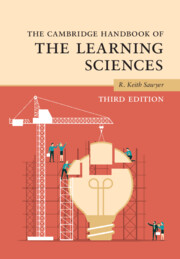Book contents
- The Cambridge Handbook of the Learning Sciences
- The Cambridge Handbook of the Learning Sciences
- Copyright page
- Contents
- Figures
- Tables
- Contributors
- Preface
- 1 An Introduction to the Learning Sciences
- Part I Foundations
- Part II Methodologies
- Part III Grounding Technology in the Learning Sciences
- Part IV Learning Together
- Part V Learning Disciplinary Knowledge
- 23 Research in Mathematics Education
- 24 Science Education and the Learning Sciences
- 25 Complex Systems and the Learning Sciences
- 26 Learning History
- 27 Learning to Be Literate
- 28 Arts Education and the Learning Sciences
- Part VI Moving Learning Sciences Research into the Classroom
- Index
- References
27 - Learning to Be Literate
from Part V - Learning Disciplinary Knowledge
Published online by Cambridge University Press: 14 March 2022
- The Cambridge Handbook of the Learning Sciences
- The Cambridge Handbook of the Learning Sciences
- Copyright page
- Contents
- Figures
- Tables
- Contributors
- Preface
- 1 An Introduction to the Learning Sciences
- Part I Foundations
- Part II Methodologies
- Part III Grounding Technology in the Learning Sciences
- Part IV Learning Together
- Part V Learning Disciplinary Knowledge
- 23 Research in Mathematics Education
- 24 Science Education and the Learning Sciences
- 25 Complex Systems and the Learning Sciences
- 26 Learning History
- 27 Learning to Be Literate
- 28 Arts Education and the Learning Sciences
- Part VI Moving Learning Sciences Research into the Classroom
- Index
- References
Summary
This chapter reviews research that examines the fundamental cognitive and social processes whereby people learn to read and write. The chapter discusses three types of literate knowledge. First, literacy can be general, such as the ability to decode words or engage in drafting and revision. Second, literacy can be task-specific: learning to read a novel and learning to read a recipe require different declarative and procedural knowledge. Third, literacy can be community-specific, in which members of a community approach a given text using different cognitive and interpretive frameworks. Learning how to read and write requires many distinct cognitive components, from decoding letters to composing and interpreting texts. Literacy also requires the ability to integrate these skills within communities of practice, and these findings are aligned with sociocultural perspectives on learning in all subjects.
Keywords
Information
- Type
- Chapter
- Information
- The Cambridge Handbook of the Learning Sciences , pp. 543 - 559Publisher: Cambridge University PressPrint publication year: 2022
